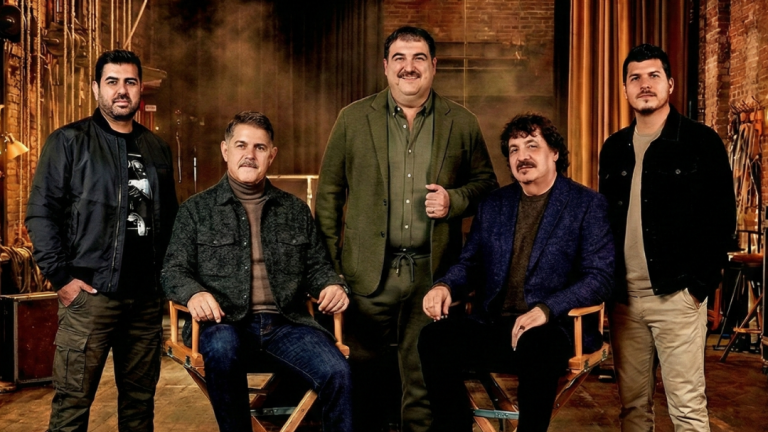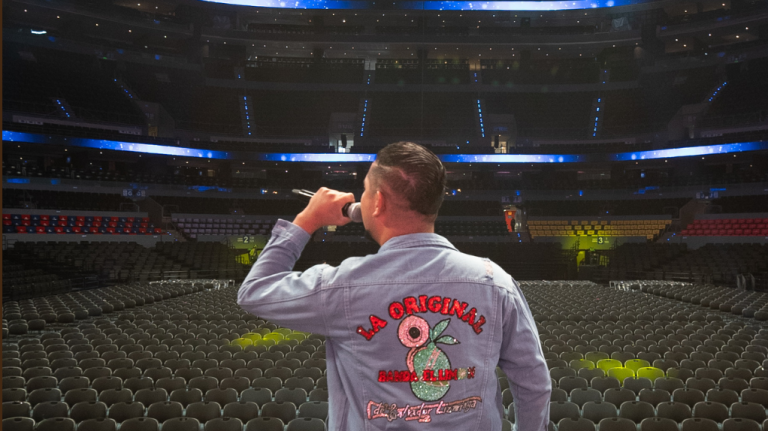By Vanessa Torres

One day before 50,000 fans were set to fill AT&T Stadium in Arlington, Texas, the stage was built and the lights were hung. But the star of the show, regional Mexican music titan Julión Álvarez, would not be performing. With his work visa abruptly revoked by U.S. authorities, the sold-out concert was postponed, leaving the promoter with an estimated $2 million in sunk costs and a stadium of disappointed fans.
Álvarez’s story is not an anomaly. It is a high-profile example of a systemic crisis unfolding at the intersection of American policy and global music. The United States, long considered the pinnacle market for any touring artist, is rapidly building a reputation not of opportunity, but of obstruction. This crisis is now being fought on two fronts: a bureaucratic and financial wall that keeps international artists out, and a climate of interior enforcement that is now keeping domestic audiences home.
Through a combination of prohibitive costs, crippling logistical delays, and a pervasive climate of political fear, the current administration’s policies are fundamentally reshaping the landscape for live music. This is more than just red tape. It is a multi-pronged assault that is actively deterring global talent, inflicting billions of dollars in economic damage, and threatening to culturally isolate the nation from the rest of the world. From independent bands forced to crowdfund thousands for non-refundable visa fees to superstars like Shakira postponing stadium shows amidst city-wide curfews, the message is clear: for many of the world’s artists and their fans, America’s stage is now closed.

The New Price of Admission: An Economic Wall at the Border
For decades, the dream of a U.S. tour was a rite of passage. Today, it comes with a staggering price tag that is silencing all but the wealthiest performers. The financial gauntlet begins with the visa application itself. In April 2024, U.S. Citizenship and Immigration Services (USCIS) enacted dramatic fee hikes for the essential O and P work visas required by musicians. The cost for a P visa petition, used for bands, skyrocketed by over 250%, from $460 to $1,615. The O visa, for individuals of “extraordinary ability,” saw a similar jump to $1,655.3 For a simple four-piece band, what was once a manageable expense has ballooned into a bill that can easily top $6,620 before a single legal or union consultation fee is paid.5
This initial barrier is compounded by what industry insiders call a de facto “expedite tax.” A 2023 decision to centralize and then randomly distribute all artist visa petitions has created administrative chaos, causing standard processing times to explode. Wait times that were once a predictable one to four months can now stretch to an astonishing eight months. With tours needing to be booked far in advance, artists are trapped in a logistical nightmare: they cannot get a visa without confirmed show dates, but they cannot confirm dates with such an unpredictable timeline.
The only way out is to pay for “premium processing,” a service that compels USCIS to act on a case within a set timeframe. That fee currently stands at nearly $3,000. When combined with the new base fees and other mandatory costs, the total upfront, non-refundable investment for a small band to tour the U.S. now routinely surpasses $10,000. This financial wall effectively filters out a massive swath of global talent, ensuring that only artists with significant commercial or institutional backing can even afford to apply. As one attorney for The Artist Rights Alliance notes, his firm sees “probably 10 cancellations a year, with people that don’t get the funding to purchase visas”.
A Climate of Fear: From the Border to the Streets
Beyond the crushing financial and logistical burdens, the administration has cultivated a climate of fear that is proving just as effective at keeping artists away. This “chilling effect” now extends from the international artist at the border to the local fan in their own neighborhood.
For international artists, an approved visa is no guarantee of entry. The final decision rests with Customs and Border Protection (CBP) officers, who have wide discretion to deny entry, detain individuals, and search personal devices. This power is amplified by new directives that grant officials the authority to deny visas based on an artist’s perceived ideology. One executive order allows for the denial of entry to those who “bear hostile attitudes toward its citizens, culture, government, institutions, or founding principles”. This transforms the visa process from a review of professional merit into a subjective political litmus test. The most explicit example is a USCIS policy from April 2025, which states that the agency only recognizes two biological sexes, male and female, as assigned at birth—a policy that directly forced the cancellation of Canadian transgender artist Bells Larsen’s first U.S. tour.
This climate of fear has now moved from the border to the interior. A nationwide surge in U.S. Immigration and Customs Enforcement (ICE) raids has created a new crisis for the live music industry, striking fear directly into a significant concert-going demographic. The impact is especially pronounced in the Latin music sector, where industry veterans have seen a staggering 30% decline in event attendance among Latino demographics following the reintroduction of tough immigration policies. In Chicago, organizers of the annual Cinco de Mayo Parade canceled the event entirely, stating, “Our community is very frightened because of the raids and the threat that ICE has imposed”. This fear creates a chilling effect that extends beyond concert halls, as immigrants become less likely to engage in any community activities, and businesses in predominantly Hispanic neighborhoods report declining foot traffic.

The response to protests against these raids has created a second, more direct logistical crisis. In Los Angeles, after demonstrations turned volatile, Mayor Karen Bass issued a late-night curfew for a square-mile area of downtown, effectively paralyzing the city’s live entertainment sector. The impact was immediate and widespread, affecting venues of all sizes:
- Major Performing Arts Centers: The Walt Disney Concert Hall canceled the final night of its celebrated Seoul Festival, and the Mark Taper Forum canceled performances of “Hamlet”.
- Arenas and Large Venues: The Peacock Theater was forced to call off the Fly High Fest, and the Fonseca Show, 2 major Latin music events, and even global superstar Shakira had to postpone a massive stadium show.
- Independent Venues and Community Events: British house DJ Cloonee postponed a two-day event at City Market, and Grand Performances postponed a free show by the band Ozomatli.
This lockdown environment is being reinforced by a significant military presence. President Trump ordered the deployment of thousands of National Guard troops to Los Angeles, and similar deployments have been ordered in other states like Texas. This heavy presence, intended to control protests, inevitably creates an environment of intimidation that is antithetical to the communal spirit of live music, further discouraging attendance and making event logistics a nightmare.
The Economic Shockwave: A Multi-Billion Dollar Hit
The consequences of this two-front crisis are inflicting staggering economic damage. The most immediate victims are the American promoters, venues, and booking agents. The $2 million loss from the single canceled Julión Álvarez show is a stark example of the financial devastation a last-minute visa issue can cause. These losses are now compounded by domestic cancellations; each day of the Los Angeles curfew was estimated to cost theaters tens of thousands of dollars.
Zooming out, the decline in international touring is a significant factor in a much larger macroeconomic problem. The World Travel & Tourism Council (WTTC) has issued a dire forecast: the U.S. is on track to lose a staggering $12.5 billion in international visitor spending in 2025 alone. The WTTC is clear that this is “not because of a lack of demand, but because of a failure to act” by the U.S. government, whose policies have damaged international traveler confidence.
Mega-tours by artists like Taylor Swift, whose “Eras Tour” is estimated to have generated a total economic impact of over $10 billion in the U.S., demonstrate the immense power of concert tourism. Each canceled international tour is a lost opportunity to capture this high-value revenue. Now, this is exacerbated by the domestic crisis. Mass deportation policies are projected to have a catastrophic effect on the U.S. economy, potentially shrinking the GDP by up to 6.2%—a downturn comparable to the Great Recession. Key industries that support the live music scene, such as hospitality and construction, would be devastated, with estimates suggesting they would lose one in eight and one in fourteen workers, respectively.
The Cultural Cost: An Impoverished Soundscape
The long-term cost of these policies is perhaps the most profound: the slow degradation of America’s cultural vitality and its standing in the world. For decades, the U.S. has been a global cultural hub, its influence built on the free exchange of art and ideas. By erecting these formidable barriers, the U.S. is actively undermining that role, building a cultural wall that isolates its own citizens. As one analysis warns, “a nation that closes its borders to art isn’t just keeping others out—it’s shutting itself in”.
The inevitable outcome is a less diverse and more homogenous American soundscape. The visa system now functions as a filter, systematically weeding out artists from the Global South, the LGBTQ+ community, and independent artists without deep pockets. This is now compounded by a crisis of domestic assembly, where fear prevents communities from gathering to share in cultural experiences. This self-imposed isolation erodes the nation’s “soft power”—the cultural influence that has long been one of its most effective foreign policy tools. Faced with this crisis, a coalition of industry groups like the American Federation of Musicians, Tamizdat, and the Future of Music Coalition are fighting back, lobbying for reform and providing legal aid to artists caught in the bureaucratic maze. But they face an administration whose policies appear to be achieving their intended effect. The curtain is falling on an era of open cultural exchange, and the cost—to American audiences, the economy, and the nation’s soul—is mounting with every canceled show and every empty seat.








